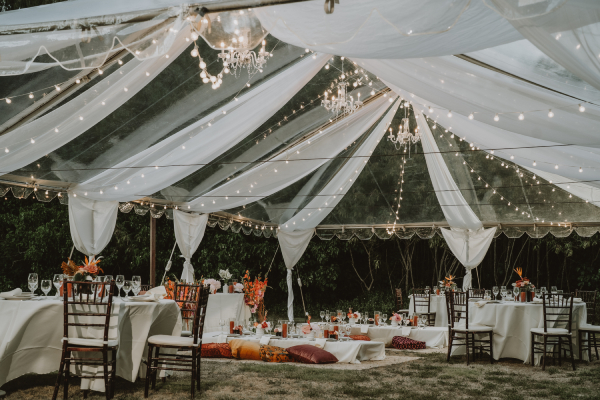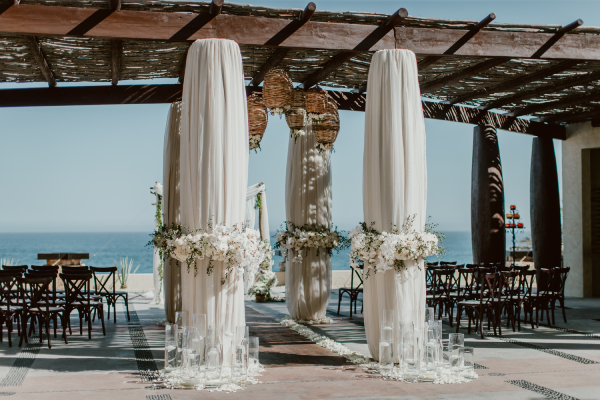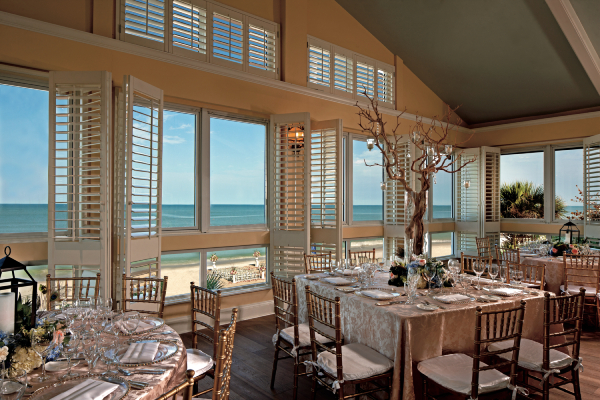When it comes to celebrating love in the time of COVID, hotels around the world are incorporating something new into onsite weddings—flexibility.
Contributed by Juliana Shallcross
From the number of guests, to the lengths of stay, types of venues, food and beverage presentations, and options for rebooking, hotels are offering couples more choices and less restrictions than in pre-pandemic times.
In the U.S., smaller weddings (between 25 and 50 guests) and outdoor weddings have definitely become de rigueur as travel remains unpredictable. But even these trimmed-down affairs aren’t immune to sudden change.

Marketing differently
Aside from providing COVID-safe weddings and developing wedding formats for smaller groups, hotels are marketing to guests differently, too. Social media has evolved into a key driver for hotel weddings by building brand and venue awareness. Digital marketing has also enabled hotels to have a more direct relationship with the guest.
Vassiliki Petridou, chief operating officer of Calilo Resort in Greece, which opened in 2019, said TikTok and Instagram have empowered the guest to choose the venue first, then hire a wedding or event planner. In previous years, he said, that was reversed.
“These digital channels have helped us a lot in brand awareness and educating our potential guests about our venues and creative productions,” Petridou said. “It has allowed us to engage with the customer directly.”
At the Turtle Bay Resort in Oahu, digital marketing and social engagement is producing more direct bookings, according to Robert Marusi, the resort’s chief commercial officer. While this was largely out of necessity, since site visits weren’t feasible for much of 2020 and 2021, Marusi said the buyer has changed too. “They’re looking at everything digitally now,” he said. As a result, his resort has increased marketing and advertising on digital channels.
Hotels in popular destinations such as beachfront locales are also seeing guests stay for longer amounts of time when attending a hotel wedding. And in cases where money is no object for the couple, hotel buy-outs are an increasingly preferred option for safety reasons.
Even as travel and events look uncertain for 2022, spending for weddings in India is still strong, said Vijay Thacker, managing director of Horwath HTL, Mumbai. “Hosts are willing to pay an additional price to ensure better compliance with norms and health requirements, including for larger rooms that are strictly needed for the event size.”
Indeed, several event managers are seeing strong demand for 2022, especially as people regroup to celebrate postponed events from 2020 and 2021. Profits may have been squeezed a little compared to 2019 and the boom years before the pandemic, but many hotels are already lining up rebookings as well as new weddings.
“Our inquiries are at an all-time high,” Marusi said. “We are hiring more social catering managers as well as marketing managers to keep this momentum. We have completely changed our brand with all new digital assets and collateral. The future looks bright.”

Making it work
Flexibility is key to staging the actual weddings, said Lydia Redmond, the longtime director of wedding sales at the Ritz-Carlton Resorts of Naples, which typically handles 60 to 80 weddings a year. “With last minute guest count changes becoming the norm, we are closely working with our couples to ensure food and beverage minimums are being met, without paying for guests who could not attend with a moment’s notice.”
Jordan Dukehart, catering sales manager at the Noelle Nashville, a Tribute Portfolio Hotel in Tennessee, agreed that the last-minute adjustment of guests has forced the hotel to be nimble with their wedding set-ups, which include both indoor and outdoor spaces. “We recently experienced a situation where we had to adjust a 100-person event to a 25-person event due to unforeseen circumstances,” she said.
In India, where weddings often consist of a few hundred guests, the guestlist has been scaled back dramatically due to safety regulations, but the ceremonies are still happening.
“Indians are known the world over to host big fat Indian weddings,” said Parveen Chander Kumar, senior vice president of sales and marketing at IHCL Hotels, Mumbai. “During the pandemic, the wedding bookings didn’t slow down, just the size was reduced as per state government guidelines.” To accommodate guests that couldn’t attend because of such restrictions, IHCL Hotels enabled live-streams of the services and provided catering from their new food delivery platform, Qmin.
Passing the tests
Enacting new government-mandated health regulations as well as company-mandated protocols is another element of the hotel wedding business that sales and catering managers now coordinate.
“We recommend individual pre-plated portions of dishes and have redesigned seating arrangements, keeping physical distancing in mind,” Kumar explained. “We also ensure all attendees wear masks.” Other essentials like thermal screenings of guests and staff, hygiene kits, queue managers, and sneeze guards are also utilized at IHCL Hotels.
In Mexico, the Waldorf Astoria Los Cabos Pedregal and Hilton Los Cabos underwent specialized training in the new EventReady with CleanStay program from Hilton.
“We have reconfigured the way we present and serve buffets and we strategically plan the event layouts, considering the number of guests, the ventilation, and prioritizing open venues usages,” said Nubia Villa, the celebrations sales manager at the Waldorf Astoria Los Cabos Pedregal.
At the Noelle in Nashville, buffets have been passed over in favor of plated meals and action stations, where a server is present at the station instead of having guests serve themselves. “This not only helps with the flow of the function, but also creates a subtle social distancing aspect without guests even realizing,” Dukeheart said.

What’s trending in weddings
Micro-wedding and Minimonies: Small weddings with 20 guests or less continue to be popular, especially in destination locales, said Andrea Frick, the sales manager at the Hyatt Regency Maui Resort and Spa. “Minimonies,” small weddings with the intent of having a second, larger celebration at another time, are also trending.
Flexible rebooking policies: Larger weddings are now given options to have scaled back events if the number of intended guests drops. Deposit schedules can be reworked accordingly and rebooking options are offered as well.
Live-streaming: For guests that can’t attend the wedding because of safety or travel concerns, hotels are partnering up with videographers to offer live streaming feeds of the ceremony. Additionally, some weddings will set-up a table in honor of those who couldn’t make it.
Longer stays: Guests are making the most out of their travel for a wedding, said Nubia Villa, celebrations manager at the Waldorf Astoria Los Cabos Pedregal in Mexico, and are opting to stay longer and make a vacation out of the trip.
Not just for Saturdays: With demand surging from couples who postponed their weddings in 2020 and 2021, midweek events are becoming more frequent, Villa added, since availability is limited. “Having a wedding on a Saturday is no longer a rule, at least for destination weddings,” she said.
